Publicado por Lattin Magazine de Canadá
Unacknowledged Victims
The following report, based on a four-month investigation into judicial proceedings related to the alleged rape of indigenous girls, is the winning entry from the 2016 Escribir sin Miedo Prize for investigative/public interest journalism in Honduras. It should be noted that during the course of the investigation, authorities repeatedly denied access to and suppressed public information.
By Wendy Funes
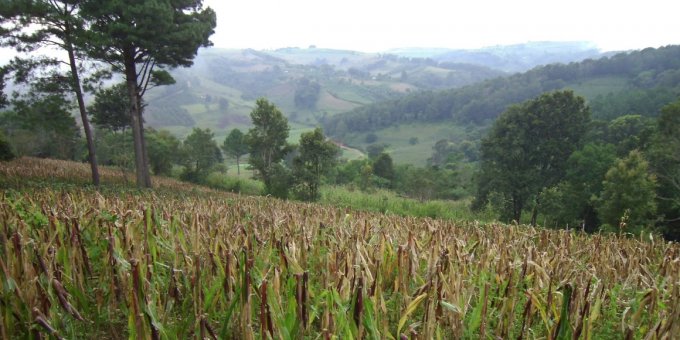
1. The Silence
Santa Elena, La Paz. The sun is setting and the wood crackling in the fire and has almost turned to charcoal. By dawn nothing will remain but ashes the colour of the kilns that indigenous people use to extract lime from the nearby hills. In the afternoon you can smell coffee boiling as mist falls on the fields and a chill enters the air.
This peaceful landscape is a Lenca Indigenous zone in the municipality of Santa Elena, adjacent to Marcala, the municipality known for producing the best coffee in Honduras. In its pristine pastures, young girls walk to elementary school – often taking several hours to get there. Few will get as far as secondary school and even fewer will go to university. Many will become mothers before they reach adolescence. The number that will suffer this fate can be gleaned from the domestic violence statistics tabulated by the police.
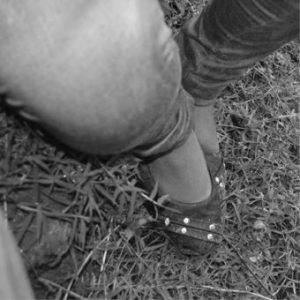 Local girls are expected to do domestic work but some also end up carrying a child that they get rid of because it reminds them of the sexual assault that produced the pregnancy. Tragically, the girls are unaware that under Honduran law this amounts to infanticide or abortion. Their attackers remain free while they go to prison and carry the social stigma of having lost their virginity.
Local girls are expected to do domestic work but some also end up carrying a child that they get rid of because it reminds them of the sexual assault that produced the pregnancy. Tragically, the girls are unaware that under Honduran law this amounts to infanticide or abortion. Their attackers remain free while they go to prison and carry the social stigma of having lost their virginity.
During our investigation, the Public Prosecutor’s Office repeatedly failed to grant requests for public information, and district Judges also did not respond. Now, however, the true story of these girls’ lives can be told. During the last twelve years, several have been imprisoned for killing their newborns. In the village, if you ask “Who has raped them?” people will tell you. “Yet the rapists go scot-free!” the villagers say.
Here, men speak up more readily than women, who are reluctant to talk with outsiders. Luisa Martínez Pérez (not her real name) left the village for work in a maquila in Tegucigalpa, the Honduran capital, a city of modern and colonial buildings built among the pines.
Luisa is a woman now. On August 12, 2004, a warrant was issued for the arrest of her alleged rapist, Woanerges Martínez. Twelve years later he remains at large. In April 2004, however, Luisa was held for infanticide after the body of her newborn baby was found in a latrine. Proceedings against her alleged rapist were begun after her detention. The alleged rape took place while she was 17 years old. A month later the warrant for Martínez was issued. Meanwhile his “victim” remained in prison until the sentence for the death of her newborn was commuted.
The Honduran Penal Code defines infanticide as the provoked death of a newborn child and abortion as the voluntary interruption of pregnancy. When a sentence for either offence is commuted, the woman is fined 10 lempiras (less than 50 cents) for each day that would have been spent in prison. On September 4, 2004, the Comayagua First Instance Court released Luisa after she paid her fine. Her sentence was four years and six months for infanticide. The release form was signed by Glenda Carolina Ayala, a Criminal Enforcement judge in the Comayagua Judicial Division (Ejecución Penal de la Sección Judicial).
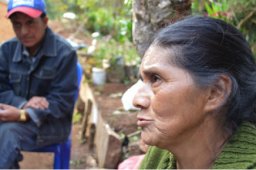 The village of Ciciguara, Santa Elena lies 70 kilometres outside Tegucigalpa. Don Luis points us to the house where Luisa’s parents live. Out here everyone knows their neighbours. We cross a field of harvested corn and follow a dirt pathway fringed with a barbed wire fence. A little adobe hut with a tiled roof sits beneath the hillside. It has taken 10 hours to travel here from the capital. Under-nourished children and skinny dogs come out to greet us, followed by the sad faces of María Pérez and her husband.Then, in keeping campesino oral tradition, the victim’s mother begins her story.
The village of Ciciguara, Santa Elena lies 70 kilometres outside Tegucigalpa. Don Luis points us to the house where Luisa’s parents live. Out here everyone knows their neighbours. We cross a field of harvested corn and follow a dirt pathway fringed with a barbed wire fence. A little adobe hut with a tiled roof sits beneath the hillside. It has taken 10 hours to travel here from the capital. Under-nourished children and skinny dogs come out to greet us, followed by the sad faces of María Pérez and her husband.Then, in keeping campesino oral tradition, the victim’s mother begins her story.
“Woanerges Martínez raped my daughter, but I didn’t know about it. She was walking back from work when a man on the side of this hill grabbed her, and took her away by force. At the time, she was too scared to tell me anything. When it was time for the baby to be born I was shocked. It happened late in the evening, close to midnight. I didn’t even know she was pregnant. Luisa was still a minor — she’d just turned seventeen – and I knew nothing about it. She had a fever, but I thought it was just a passing thing, nothing serious.” By midnight police had surrounded the house. They said Luisa had committed a crime. María did not know why they were taking her daughter away: “I couldn’t believe it.”
“They kept her in detention until she paid. She was in prison for five months. Who knows what would have happened if we hadn’t found a lawyer. Meanwhile, that man and his family were still here in the village. They never offered to help get her out of prison. We had to sell our belongings to make that happen. That’s how it was – he had complete impunity.”
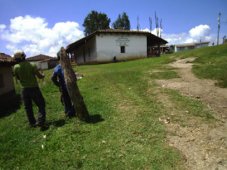 María has had a terrible time since then. She can’t stop thinking about the tragedy that befell her daughter while she was still a child. Luis Martínez, her husband, remains bitter. He cried every time they returned from visiting Luisa in prison. “I was devastated and kept thinking about going away, to forget. I suffered. I suffered. It was a very hard time. We walked to and from prison in Márcala, with nothing to eat all day. Our family suffered. It was unbelievable, five months, without help from anyone.”
María has had a terrible time since then. She can’t stop thinking about the tragedy that befell her daughter while she was still a child. Luis Martínez, her husband, remains bitter. He cried every time they returned from visiting Luisa in prison. “I was devastated and kept thinking about going away, to forget. I suffered. I suffered. It was a very hard time. We walked to and from prison in Márcala, with nothing to eat all day. Our family suffered. It was unbelievable, five months, without help from anyone.”
María struggled too. After six months in jail, Luisa was finally released. Twelve years later, Maria still thinks about the man sticking a gun in Luisa’s chest, and threatening to hurt her if she said anything.
Not many people carry firearms in Santa Elena. Most campesinos – either for cultural reasons, or because of their work in the fields – travel with nothing more than a machete or a knife in their belt. For the last several years, the Violence Observatory at the National Autonomous University of Honduras has recorded no gun deaths in Santa Elena. Most of the assaults recorded by the police between 2012 and 2016 were stabbings. Oddly, the absence of homicides continued even in 2012 when Honduras had the world’s highest murder rate (85 per 100,000 inhabitants). Firearm possesssion – during an alleged assault – should have prompted a police investigation. But it didn’t.
Impunity does not occur by happenstance. On the afternoon that journalists turned up at the Martínez house to investigate the dead baby, a police patrol arrived shortly after. The police got out of their patrol cars and took Martínez aside to ask him about a person they were supposedly looking for. Martínez spoke with an officer for a few minutes. Then the police left the area.
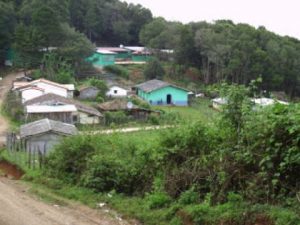
2. Undisclosed Cases
On January 21, 2013, the Marcala Public Prosecutor’s Office registered an infanticide (Report No. 2013-1208-0701) in the community of Guasore. Public Ministry documentation, based on reliable sources, indicates that the body of a newborn was removed from the site, wrapped in a sheet and placed in a black plastic bag. The body was covered in blood and feces and a disposable diaper had been stuffed in its mouth. When asked for further information, the Public Prosecutor’s office denied access to and suppressed public information about the case. We could not confirm the identity of the woman accused of infanticide, nor find out whether she had been raped. The denial of access to information was recorded in Resolution 295-2016 and signed by the Assistant-Director of Prosecutors, Loany Alvarado.
The Public Prosecutor’s Office in the Public Ministry (MP) would confirm only that a woman had been charged with infanticide and that she could appeal the sentence at the judiciary. We then asked the Access to Public Information Institute (IAIP) to ascertain if, by withholding this information from us, the MP had violated the right to public information. The MP declared that the information was under the control of the Supreme Court, so we proceeded to request information from the Marcala First Instance Court regarding infanticide, abortion and rape cases registered between 2004 and 2016.
A First Instance judge in Marcala denied us access to this information, so we couldn’t determine which cases had been submitted to this court during that time. Eight requests were presented to the judiciary, the MP, the Secretary of Health, the National Police and the Marcala First Instance Court, La Paz, which has legal jurisdiction in Santa Elena. In five of the eight requests, the result was suppression of data. The fact that official information was deliberately suppressed makes it obvious that the authorities knew full well how many rapes and abortions had occurred during that period.
Although they did not grant access, even to the logbook where complaints are filed, the judiciary did inform us that in 2012 two accusations of infanticide had registered in Santa Elena, two more in 2013, and a fifth case in 2015. This information was made available through the Transparency Office, using data from its own statistics. This means that over the course of three years, five infanticides, or violent deaths of newborn babies took place in the indigenous zone of Santa Elena.
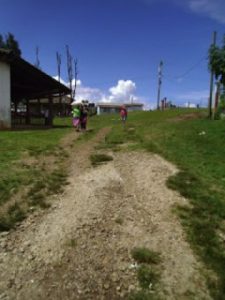 Even though the Observatory has declared Santa Elena to be a municipality without firearm-related homicides, the confirmed occurrence of five infanticides demonstrates that there is a structural problem in this municipality, one the justice system has not been able to resolve.
Even though the Observatory has declared Santa Elena to be a municipality without firearm-related homicides, the confirmed occurrence of five infanticides demonstrates that there is a structural problem in this municipality, one the justice system has not been able to resolve.
In Lenca indigenous culture, transmitted from generation to generation, before you chop down a tree, you have to ask permission. The Lenca believe that children’s spirits are contained in the rivers and that animals must respect each other. In this cultural context, if an indigenous girl kills a newborn baby, it is a sign that there is a serious underlying problem.
In 2016, after four months of trying to investigate judicial processes related to these events, our requests for information were denied and information was repeatedly withhheld by the authorities. Between 2013 and 2015 our requests under the Transparency and Access to Public Information Law were treated the same way. Since then, statements have come to light showing that between 2004-2016 at least seven girls testified that they had been sexually violated. Their statements were registered in the villages of Ciciguara, Opalaca and Llano de Maco, in the municipality of Santa Elena. The statements, made by two minors, revealed that one of them had paid money to have her sentence commuted and be let out of jail. In the meantime, her rapist was still a free man. The other victim has been suffering from trauma for the last two years. Her rapist has also remained free, due to lack of evidence.
There could, in fact, be more victims. Besides the statements that came to light, the police reports we obtained contain further data on the number of assaults, confirming that authorities are aware of the problem. In the last twelve years, at least three indigenous Lenca girls have been sent to jail. They are indigenous children who were raped then pressured to abort or kill their newborn baby after concealing their pregnancy for nine months. Some went to jail while their rapist remained free.
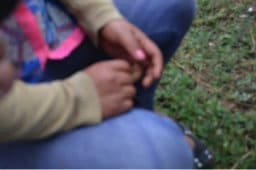 3. She Was Thirteen Years Old
3. She Was Thirteen Years Old
By looking at her hands and braided black hair, you can tell that she has just turned 15. It has been two years since she was sexually assaulted. A man threatened her with a machete. He dragged her into the cornfields and kept her hidden there. She was tied up all night. It is still difficult to talk about. She wrings her hands and bites her lip. She wants to ensure that other girls do not go through what she did.
The attack came when she was returning to her aunt’s house from a fiesta. She lived with the aunt because it was closer to school. A few minutes earlier, she had said goodbye to her cousin. As she crossed a cornfield on her way home, a man with a hood stopped her. He put a machete to her throat and threatened her. Then he bound her hands and kept her like that while he assaulted her throughout the night.
When we talk, two years later, the birds are singing in the background and you can feel the damp air on your face. Sitting outside her house, where you can see the green fields of the village of Opalaca, divided by a barbed wire fence, the teenager recalls that night. Her story echoes at least four others told by girls from this village in Santa Elena:
“I was staying with my aunt. I was going to school and the institute I studied at was quite far away. I rented a room at my aunt’s, so I wouldn’t have to get up at 3 a.m. to get there. I remember there was a fiesta that night.” The interviewer interrupts to ask her little sister to go to another part of the house so she won’t hear what comes next.
“It was an hour’s walk from my aunt’s house to the college. That night I’d come home with my cousin because I had no one to go with and she knew the way. She showed me a shortcut, through an isolated area. Then she went home and I set out for my aunt’s house. You have to go down a dark road to get there and it was dark outside. It was around six in the evening. But to get to my aunt’s house you have cross a cornfield. I was just getting to the cornfield.”
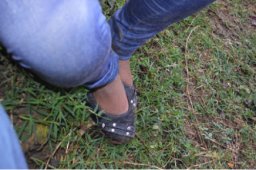 She clears her throat: “It is hard to talk about this. Anyway, I was going down the road. There was a big bush – that’s where the man was hiding. He wore a hood and carried a machete. He pointed it at my throat and said he would kill me straightaway if I said anything. Then he took me into the cornfield. That’s where it happened. He wouldn’t let me go.”
She clears her throat: “It is hard to talk about this. Anyway, I was going down the road. There was a big bush – that’s where the man was hiding. He wore a hood and carried a machete. He pointed it at my throat and said he would kill me straightaway if I said anything. Then he took me into the cornfield. That’s where it happened. He wouldn’t let me go.”
“It was terrible. I spent the night with my hands bound by a cord. Around 5 a.m. he untied me. I asked God to help me escape because I thought it was the end for me. He kept threatening me. I held onto my phone tightly. He tried to take it from me, but he couldn’t.”
“Then, I put on some clothes that I had in my knapsack and run away. It was still early so my aunt wasn’t up. I can’t describe how I felt. When I got to the house, I took off my clothes and washed them. Then I washed myself. It was almost time to go to college. He had told me not to say anything – and that’s the mistake I made. I washed myself, put on my uniform and I didn’t say a thing to anyone. I didn’t know what to do, I was trying to hide what I felt. Like I had a knot in my throat. In the end, I did identify him – his name is … but on that day I went to college.”
“Usually on the way to school, we would joke around so we wouldn’t get tired from walking. That day was different. I walked with the others but didn’t talk. My brother was the first person I told. He said I had to speak up….” On the same day, the girl told her mother everything. They went to the public prosecutor and the police. Her attacker had been harrassing her for some time. He was incarcerated for a while.
In Honduras, rape carries a maximum prison sentence of ten years. Two years after the victim gave her statement, her rapist is free. We were unable to find out more about the alleged rapist because the Marcala First Instance Court denied us access to the logbook that records trials. However, police reports confirm that formal complaints have been filed with the authorities. The documents show that rapists have an established pattern in the area: they attack in remote areas, threaten women with weapons and abuse them physically. In some cases, if someone surprises the rapist, the attacker is accused of attempted rape.
4. Political Connections
If such cases are common, why would police want to monitor journalists who investigate the rape of an indigenous girl? One answer may be found in a statement by Asunción Martínez, coordinator with the Civil Council of Popular and Indigenous Peoples of Honduras (COPINH), who explains that the Martínez Pérez family is afraid to speak up.
Asunción is about 5 foot three inches tall and has indigenous facial features. He speaks forcefully. His work as a human rights defender has allowed him to travel far and wide. In his original statement, he indicated that the alleged rapist pleaded guilty in order to protect the former mayor of the municipality. None of the authorities consulted knew anything of this version of events, and no evidence to support it has come to light since. The Public Prosecutor’s office has denied access to and suppressed nearly all the information we requested concerning infanticides and abortions, and it has been difficult to obtain an official report that would show whether forensic analysis was performed on the body of the newborn to identify the father. Martínez believes that the crime will remain unsolved because information he has obtained indicates that the perpetrator has left the country.
“Unfortunately, in our municipality, young girls are regularly subjected to sexual assault. Sometimes those girls, and their parents, are too scared to file a complaint. Unfortunately, there are protection networks at work inside the National Police and within the Municipal Corporation. Employees with the Santa Elena municipality have been involved in such cover-ups.”
Martínez gives the names of municipal employees who have been denounced for committing rape, including an ex-mayor, but there is no technical evidence that these rapes took place because, in most cases, the girls were scared to speak up and too much time went by. The Public Prosecutor’s Office lacks the technical means to investigate sexual assaults once too much time has elapsed.
“When Berta Cáceres, general coordinator of COPINH, was still alive, there was a plan to go into the communities and identify problems, especially problems experienced by women, because these rapes have been commonplace in Santa Elena,” said Martínez, specifying communities like Llano de Maco, Ciciguare and El Potrero. He adds that in Santa Elena, teachers have made statements to the effect that some mayors have been known to promise girls a job in exchange for sexual favours. Martínez described how the culture of machismo and discrimination in Santa Elena generates gender-based violence in indigenous communities.
In most communities, individual land deeds are in the name of the man rather than the woman. Men are seen as heads of the household. Their female partners have to ask permission to engage in commercial activities such as selling beans, corn or eggs.
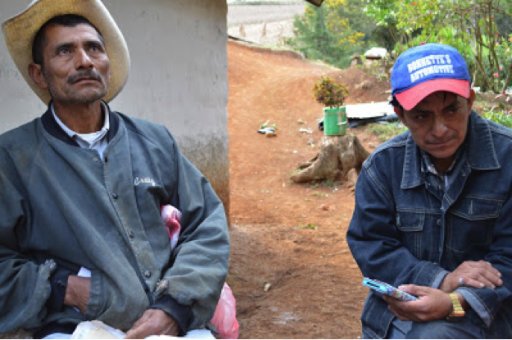
One example of the culture of violence can be found in Complaint No. 57-14-11-2014, received by the National Police, regarding domestic violence. The victim states that around 7 a.m. on November 14, 2014, she went to El Centro de Santa Elena to pick up the Bono Diez Mil – a state subsidy for poor families that is distributed by the office of the President. “Around 2.30 p.m., I left to go home. I got to my house, in the village of Quiscamote, around 5.30 p.m. When I entered, the man I live with said, Why are you so late? Only streetwalkers go out in the evening. I said I wasn’t walking the streets, that I’d used the bonus to buy things for the kitchen, since he never bought us anything. Just for that, he grabbed me by the neck and punched me in the nose. Then he kicked me in my buttocks and called me a prostitute.”
Journalists in La Paz, the district capital, sometimes travel into the 18 municipalities and broadcast similar complaints through the local media. (The local press survives by printing publicity for local politicians, municipal leaders and businessmen.) Irán Ángel Padilla, a La Paz newscaster, has his own radio show. He says that when he visits the interior he receives complaints from different sectors. Padilla has heard complaints about local politicians who have allegedly assaulted minors sexually. There are also complaints from girls and boys who have been sexually abused by their parents. There is a culture of incest and no one is doing anything about it because they don’t dare speak up. Too many complaints remain under investigation because of economic difficulties, or political issues, and often because of family situations, said Padilla.
According to Felipe Benítez, coordinator of the La Paz Lenca Indigenous Movement (MILPAH) in Santa Elena, there are many problems such as the rape of minors in the area. One girl knew her rapist. He was taken and sent away but now he is out free and has been threatening members of her family. In Llano de Maco, there is a girl who was sent to prison for aborting her child.
Church representatives, Delegates of the Word, have stepped up to testify in support of the aggressors. This happened in the community of El Pelón.
“There is a girl, a friend of my daughter, who got pregnant. She says she was raped and has made a formal complaint about it. She is from Opalaca. Her mother even has the messages her rapist sent her. Some of the activists on the political scene right now are actually rapists.”
Eduardo Benítez, a schoolteacher and resident of Opalaca, concurred: “It’s true that girls are being raped. There have been many cases of rape in the municipality of Santa Elena and the saddest thing is that the authorities don’t punish the aggressors. Sometimes they detain them for a month, or put them in jail for six months; but then they set them free. The laws seem to work in favour of these criminals.”
As a teacher, Benítez heard that in Opalaca alone, there have been five complaints of rape and there have been pregnancies as well. This could be evidence of young people engaging in illicit behaviour, or it could be evidence of individuals with political connections who know they won’t face any consequences for their actions.
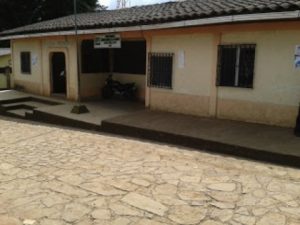 5. The View of the Authorities
5. The View of the Authorities
Rapes occur in a cultural context of sexual discrimination. Most reports to the police and to the justice of the peace are related to domestic violence. Antonio Vásquez, Director of the Municipal Judiciary in Santa Elena, La Paz, believes that complaints about rape are rumours and have no legal basis. He maintains that such complaints should be based on evidence. However, he points out that cases of rape and domestic violence are dealt with swiftly.
Authorities in Santa Elena, the police, the court and the committees, work together but they have not been receiving formal complaints. “I have not received any information. We have not received any complaints.” Vásquez goes on to say that some complaints are made only to put people in a bad light. That is why it is better to make a formal statement to the appropriate authorities.
In Santa Elena there is a Municipal Women’s Office that deals with these cases. Vásquez invited indigenous representatives from MILPAH and COPINH to denounce irregularities in their communities so that authorities can investigate the situation. “Sometimes we don’t know how to deal with these people, because they have a different mentality and ideology, but we have to respect them,” he says.
According to Cesar Lazo, director of the Health Divison in Santa Elena, the number of teenage pregnancies went down this year. In 2015 there were 48 pregnancies; this year, 27. Lazo says he has received no reports of recurring rapes in the municipality. Recently, just one girl, in April or May, reported a rape. She ended up pregnant and gave birth to a child. “We are investigating the case and attempting to find out about the welfare of the girl. As far as we know, the person responsible for the rape is in prison, but we prefer not to get involved in legal questions. We leave that to the court.”
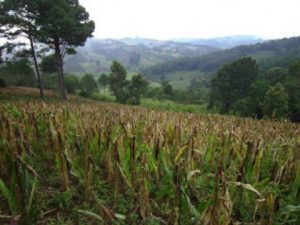 This village in the district of La Paz, 170 kilometres from the captial lies in the central part of Honduras. The municipality covers 185 square kilometres. The most well known politician in the area is Gladys Aurora López, Vice-President of the National Congress. Indigenous social movements in La Paz submit more complaints about her than anyone else. López is an elected representative, but she is also involved in providing electricity for the state through the construction of the hydroelectric dam, which has been a source of conflict in the area. While the Lencas, through the Lenca Indigenous Council of La Paz, protest that nature is being destroyed and their lands are be taken from them, contrary to ILO 169, supporters of the Partido Nacional, which is in power, claim that MILPAH and COPINH show no respect for authority.
This village in the district of La Paz, 170 kilometres from the captial lies in the central part of Honduras. The municipality covers 185 square kilometres. The most well known politician in the area is Gladys Aurora López, Vice-President of the National Congress. Indigenous social movements in La Paz submit more complaints about her than anyone else. López is an elected representative, but she is also involved in providing electricity for the state through the construction of the hydroelectric dam, which has been a source of conflict in the area. While the Lencas, through the Lenca Indigenous Council of La Paz, protest that nature is being destroyed and their lands are be taken from them, contrary to ILO 169, supporters of the Partido Nacional, which is in power, claim that MILPAH and COPINH show no respect for authority.
In the middle of all this conflict, young girls remain extremely vulnerable. MILPAH and COPINH claim that Partido Nacional and Partido Liberal activists have been known to sexually assault minors. There is no official confirmation of this complaint. Between 2013 and 2015, the crimes most commonly reported to the justice of the peace in Santa Elena and to the police were rape and domestic violence, indecent behaviour in public, illegal sale of aquardiente, illegal possession of (commercial) firearms, vagrancy, assault and threats. Yet, as of this writing, neither a new judge nor a new justice of the peace for the area has been appointed.
This Lenca indigenous zone has a dry tropical climate. The Partido Nacional de Honduras is currently in power in the area. This is the party of the President of Honduras, Juan Orlando Hernández. Houses in the village are adobe (earth and water), there are dirt streets, a health centre, and a justice of the peace. Between 2013 and 2016, the crime most reported to the police was domestic violence — according to their logbook.
This Lenca indigenous zone has a dry tropical climate. The Partido Nacional de Honduras is currently in power in the area. This is the party of the President of Honduras, Juan Orlando Hernández. Houses in the village are adobe (earth and water), there are dirt streets, a health centre, and a justice of the peace. Between 2013 and 2016, the crime most reported to the police was domestic violence — according to their logbook.
This story is the winning entry from the 2016 Escribir sin Miedo Prize for investigative/public interest journalism in Honduras. The competition was established in 2015 as a joint initiative by PEN Canada and PEN Honduras. The story was made possible thanks to a crowdfunding campaign by Press Start.
 A journalist since 2001, Wendy Funes has worked in print, radio, and television, covering human rights and security issues. She has led the investigative unit at Conexihon.hn, a website operated by the independent Freedom of Expression Committee (C-Libre). Funes also works as a magazine editor and as a consultant in investigative journalism. A few years ago Wendy Funes faked her own death and bought her own death certificate as part of an expose that led to reforms in Honduras’ corrupt Civil Registration Office. In another investigation, she dressed up like a panhandler to shed light on the lives of the poor in the Honduran capital, Tegucigalpa, and revealed that children were being forced to beg in the streets.
A journalist since 2001, Wendy Funes has worked in print, radio, and television, covering human rights and security issues. She has led the investigative unit at Conexihon.hn, a website operated by the independent Freedom of Expression Committee (C-Libre). Funes also works as a magazine editor and as a consultant in investigative journalism. A few years ago Wendy Funes faked her own death and bought her own death certificate as part of an expose that led to reforms in Honduras’ corrupt Civil Registration Office. In another investigation, she dressed up like a panhandler to shed light on the lives of the poor in the Honduran capital, Tegucigalpa, and revealed that children were being forced to beg in the streets.
Comentarios